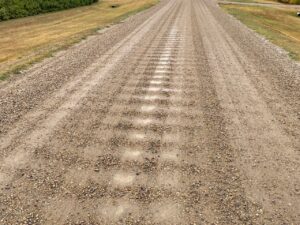Soils compaction is the key element of successful road construction and rehabilitation. By learning about soil compaction, best practices, and using soil stabilization, you can build strong and safe roads that will last for years.
Why is road compaction important?
When constructing or rehabilitating a road, soil compaction has a critical effect on the stability and durability of the road. A poorly compacted road may lead to endless problems including failures, safety issues and increased maintenance costs.
What is soil compaction?
Soil compaction occurs when the particles in the soil are compressed and made denser, therefore removing the spaces and voids in between the particles, which then makes the road structure stronger and more stable.
Benefits of increased soil strength and stability, or load bearing capacity:
- Withstand the pressure of heavier vehicle traffic.
- Have greater structural strength which makes it less prone to settling, shrinking, cracking and deforming.
- Less space between the soil particles prevents water from being absorbed in between the particles, which weakens the soil structure.
Factors that affect soil compaction:
- Amount of moisture present in the soil: The optimal amount of water in the soil aids compaction by allowing the particles to move into place and be compressed together. However, too much water can impede compaction.
- The amount of force and pressure applied to the soil: The type of machinery used to roll, tamp and vibrate the soil will affect the density of the soil after compaction. A variety of equipment may be used in soil compaction, including, static rollers, vibrating rollers, pneumatic (wobbly wheel) rollers, sheep foot rollers, and compactors (Rammers).
- The type of soil present: Gravel and sand are compactable and stable, while silt and clay require additives to manage water retention, which causes swelling, slipperiness and inability to withstand heavier loads.
Soil Stabilization as a method to aid soil compaction:
Soil stabilization enhances the soil’s strength, stability and susceptibility to moisture, therefore aiding in better soil compaction. Especially problematic soils, such as clays need chemical additives to treat the clay particles to enhance resistance to moisture.
Clay particles inherently attract moisture, which then becomes bound to the surface of the clay particles. This bound water causes swelling and slipperiness between the clay particles, which makes them difficult to interlock and compact together.
Chemical soil stabilizers, such as GRAVELOCK Soil Consolidator, are designed to change the chemical makeup of the clay particles, causing them to repel moisture, rather than attract moisture. Because there is no longer a layer of water between the particles, when compacted, the particles now become bonded simply by direct contact.
Unlike other stabilizers, GRAVELOCK is a one-time, permanent treatment which allows clay soils to reach their maximum density, with less mechanical effort. This results in a permanently stabilized construction material.
Alexis Nakota Sioux Nation GRAVELOCK Testimonial
Alexis Nakota Sioux Nation transformed their rutted roads using GRAVELOCK, applied by their own band members. In just 10 weeks, road strength and bearing capacity surged by 183%, ensuring smooth, safe travel for school buses and the community.
In conclusion, let’s look at the best practices to achieve optimal road compaction:
- Analyze what type of soil you have and what is required to the density required for a stable, compacted road base.
- Understand the moisture content of the soil to achieve the best conditions that allow the soil particles to interlock and not swell over time.
- Use the right equipment to achieve compaction and compact the road in layers, as not to have variabilities in density, which causes weak spots.
- Use soil stabilizers when problematic soils are present, to help with the compaction process.
By understanding how to achieve optimal soil stabilization and compaction for your roads, the benefits are endless. Not only will you save money in your maintenance budget each year, but you will also have safer, longer lasting roads which enrich your community’s infrastructure leading to development and economic growth.




